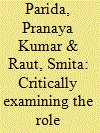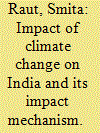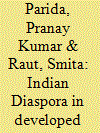|
|
|
Sort Order |
|
|
|
Items / Page
|
|
|
|
|
|
|
| Srl | Item |
| 1 |
ID:
132495


|
|
|
|
|
| Publication |
2014.
|
| Summary/Abstract |
Each day, natural disasters such as ?oods, earthquakes and hurricanes/ cyclones threaten human life and cause severe environmental losses around the world. During the last decade, disasters have affected the lives and assets of almost 2.4 billion people across the world (OCHO, 2010). In India alone since the year 2000, an average 65 million people have been affected by disasters every year. Of this, 8.45 million have been children under the age of ?ve and 3.25 million are pregnant and lactating mothers (UNICEF). Such
humanitarian crises often set back the developmental gains of lesser developed regions by several" decades. Not only do disasters lead to the loss of life and property, but "the immediate a?ermath is a complex situation complicated by issues of logistics, search and rescue, relief distribution, limited accessibility to some of the affected areas, the threat of secondary disasters, the mostly well-intentioned interests of diverse stakeholder groups (which many a times are external to the context of thedisaster), the in?ow of aid material and grants, political interest, media interest and often limited administration capacity. Government is responsible for administrative arrangements dealing with disasters.- Effective policies play a vital role in mitigating the impact of disasters and reducing likely losses of life and property ( Erramilli, 2008) . The disaster management, which is not being treated as a sector by itself, is
undergoing major changes, especially at the institutional and policy levels, which are prompted by various. macro-level factors ( Wagle and Warghade, 2006). Effective coordination among various stakeholders, specifically the Government, the international community and nongovernmental organizations (NGOS) in the aftermath of a disaster is critical to, among other things, a minimization in disaster response time, the proper allocation of resources and the avoidance of duplication of response efforts; Moreover, as economic growth and sustainable development are essential to successful disaster preparedness and mitigation efforts, effective coordination has the potential to strengthen the link between emergency response, preparedness and long-term development strategies.
|
|
|
|
|
|
|
|
|
|
|
|
|
|
|
|
| 2 |
ID:
185416


|
|
|
|
|
| Summary/Abstract |
There is urgent need for strong linkages between North and South Africa to make it United Africa, so that it will be capable enough to fight against imperialist forces and raise the voice against the onslaught of neocolonialism and the existing market forces.
|
|
|
|
|
|
|
|
|
|
|
|
|
|
|
|
| 3 |
ID:
125275


|
|
|
|
|
| Publication |
2013.
|
| Summary/Abstract |
Since centuries and for generations people across the globe among various communities' practice many things in their day to day life, which has serious implication on nature, environment, sustainability and availability of resources as well as utilisation at local level. Nonetheless, in the domain of traditional knowledge much has to be explored to give it a proper shape and dimension in policy level to not only preserve it but also give a legal sanction and scientific acceptance.
|
|
|
|
|
|
|
|
|
|
|
|
|
|
|
|
| 4 |
ID:
127525


|
|
|
| 5 |
ID:
128183


|
|
|
|
|
| Publication |
2014.
|
| Summary/Abstract |
The Indian Diaspora is a genetic term to describe the people who migrated from territories that are currently within the border of the Republic of India. It also refers to their descendants. The Diaspora is currently estimated to number over twenty million composed of NRI-Indian citizens not residing in India and PIO-persons of Indian Origin who have acquired the citizenship of some of other country. The Diaspora covers practically every part of the world.
|
|
|
|
|
|
|
|
|
|
|
|
|
|
|
|
|
|
|
|
|